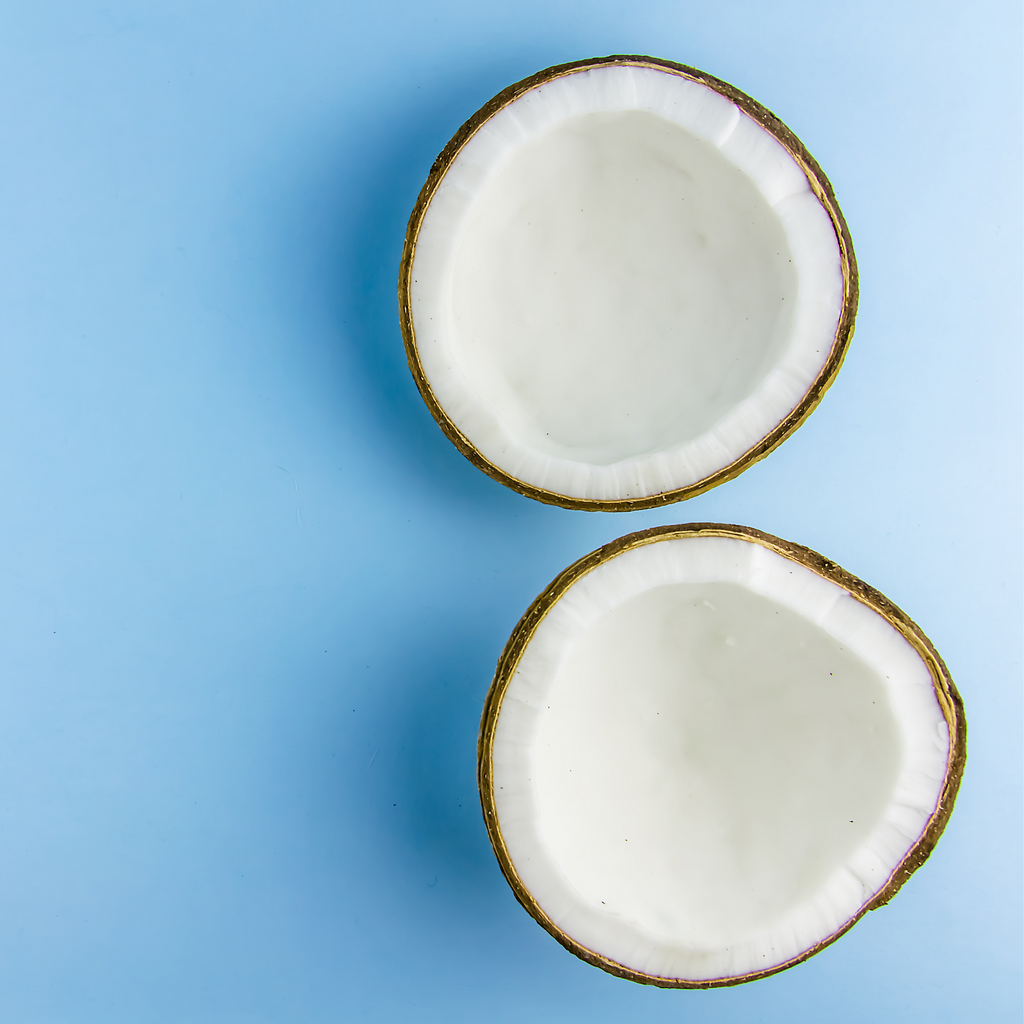What does virgin coconut oil smell like?
Virgin coconut oil has a strong natural coconut aroma that is buttery and sweet and evokes memories of summer days at the beach.
Cold-pressed, unrefined extra virgin coconut oil has the strongest natural coconut scent.
Why does virgin coconut oil smell so good?
This article will discuss:
- What is virgin coconut oil?
- How is virgin coconut oil made?
- What is virgin coconut oil made of?
- What are the aroma compounds of virgin coconut oil?
- What does coconut oil smell like?
- What does extra virgin coconut oil smell like?
- What does virgin coconut oil smell like?
- What does coconut oil smell like?
- What does refined coconut oil smell like?
- What does MCT oil smell like?
- What does lauric acid isolated from coconut oil smell like?
- What are the benefits of virgin coconut oil?
- Summary
- Reference

What is virgin coconut oil?
Virgin coconut oil (Cocos nucifera) is pure cold-pressed coconut oil from the coconut palm fruit.
Virgin coconut oil is made by cold pressing the oil from the coconut meat.
Virgin coconut oil is unrefined - it has not been bleached or deodorized.
Learn more: What is Virgin Coconut Oil?
We use organic extra virgin coconut oil that is cold-pressed and unrefined.
Our coconut oil is Fair Trade and comes from a sustainable source.
Our virgin coconut oil has a strong natural coconut aroma that is rich, creamy and subtly sweet.
Dry Skin Love Nourishing Coconut 5% Vitamin C Face Oil is a luxurious face oil made with 9 premium ingredients, including cold-pressed extra virgin coconut oil and gentle vitamin C ester tetrahexyldecyl ascorbate.
How is virgin coconut oil made?
Virgin coconut oil can be produced directly from the fresh coconut meat, or from coconut milk, or from coconut milk residue (Bawalan et al, 2006).
Virgin coconut oil is obtained from fresh, mature kernel (meat) of the coconut by mechanical or natural means, with or without the use of heat, without undergoing chemical refining, bleaching or de-odorizing, and which does not lead to the alteration of the nature of the oil (Bawalan et al, 2006).
Virgin coconut oil differs greatly from traditionally produced, copra derived coconut oil, which must undergo chemical refining, bleaching and de-odorization processes to make it suitable for consumption (Bawalan et al, 2006).
Virgin coconut oil has a fresh coconut aroma that can be mild to intense depending on the oil extraction process used.

What is virgin coconut oil made of?
Virgin coconut oil is composed of fatty acids, polyphenols and minor compounds such as lactones.
Virgin coconut oil is composed of fatty acids
Virgin coconut oil is mainly composed of saturated fatty acids, including lauric acid, myristic acid and palmitic acid.
Virgin coconut oil contains fatty acids including:
- 49% lauric acid
- 18% myristic acid
- 8% palmitic acid
- 8% caprylic acid
- 7% capric acid
- 6% oleic acid
- 2% linoleic acid
- 2% stearic acid

Virgin coconut oil is rich in polyphenols
Virgin coconut oil is also rich in polyphenols with antioxidant activity (Marina et al, 2009).
Virgin coconut oil has been shown to contain:
- 5.09 mg/kg ferulic acid
- 2.08 mg/kg vanillic acid
- 0.45 - 0.90 mg/kg syringic acid
- 0.75 mg/kg p-coumaric acid
- 0.12 mg/kg caffeic acid
The total phenolic contents in virgin coconut oil are higher than refined coconut oil (Marina et al, 2009; Rohman et al., 2021).

What are the aroma compounds of virgin coconut oil?
The aroma of virgin coconut oil is rich, creamy and subtly sweet, with undertones of fresh fruit.
Lactones are the main flavor compounds that provide the coconut aroma.
- δ-octalactone has a fatty coconut aroma, with mild green undertones.
- δ-decalactone has a creamy, coconut aroma with slight peach undertones.
Virgin coconut oil also has minor compounds that contribute a fruity aroma:
- ethyl decanoate has a sweet apple aroma.
- ethyl acetate has a pleasant fruity odor, similar to pear.
- nonanal smells like citrus peel, with cucumber undertones.
- limonene smells like fresh sweet orange.
Virgin coconut oil has aroma compounds also provide freshness:
- 2-heptanone has fruity, waxy and green notes.
- hexanal smells like freshly cut grass.
Cold-pressed, unrefined extra virgin coconut oil has the strongest natural coconut scent.
Virgin coconut oil is minimally processed, so it retains its nutrients and aromatic compounds.

What does coconut oil smell like?
The aroma of coconut oil can vary greatly depending on how it is processed.
Extra virgin coconut oil and virgin coconut oil have the strongest natural coconut aroma.
Virgin coconut oil is minimally processed, so it retains its nutrients and aromatic compounds.
Refined coconut oil and MCT oil derived from coconut have minimal to zero coconut aroma.
There are several different ways coconut oil can be processed:
- Extra virgin coconut oil
- Virgin coconut oil
- Refined coconut oil
- MCT fractionated coconut oil
- Lauric acid isolated from coconut oil
What does extra virgin coconut oil smell like?
Extra virgin coconut oil is similar to virgin coconut oil.
Extra virgin coconut oil has a strong natural coconut aroma that is buttery and sweet.
What does virgin coconut oil smell like?
Virgin coconut oil has the strongest natural coconut aroma.
The aroma of virgin coconut oil is rich, creamy and subtly sweet, with undertones of fresh fruit.
What does refined coconut oil smell like?
Refined coconut oil has little to no smell. It has no distinct coconut taste or aroma. This is because it’s made from coconut meat that has been filtered and dried before being pressed into oil.
What does MCT oil smell like?
MCT oil can be derived from coconut oil.
MCT oil or medium chain triglyceride fractionated coconut oil is scent-free and has no distinguishable coconut aroma.
What does lauric acid isolated from coconut oil smell like?
Lauric acid is a fatty acid that can be isolated from coconut oil.
Lauric acid isolated from coconut oil is scent-free and has no distinguishable coconut aroma.

What are the benefits of virgin coconut oil?
Virgin coconut oil is not only a sensory delight, but also has many benefits for dry skin.
- Virgin coconut oil is rich in nutrients
- Virgin coconut oil is easily absorbed into dry skin.
- Virgin coconut oil softens dry skin
- Virgin coconut oil relieves dry skin
- Virgin coconut oil protects dry skin
There are many benefits of virgin coconut oil for dry skin.
Learn more: 5 Benefits of Virgin Coconut Oil for Dry Skin

Summary
Do you like the smell of virgin coconut oil?
Cold-pressed, unrefined extra virgin coconut oil has the strongest natural coconut scent.
Virgin coconut oil is rich in beneficial fatty acids and phenolic compounds with strong antioxidant activity.
We use organic extra virgin coconut oil that is cold-pressed and unrefined.
Our coconut oil is Fair Trade and comes from a sustainable source.
Our virgin coconut oil has a strong natural coconut aroma that is rich, buttery and sweet.
Dry Skin Love Nourishing Coconut 5% Vitamin C Face Oil is a luxurious face oil made with 9 premium ingredients, including cold-pressed extra virgin coconut oil and gentle vitamin C ester tetrahexyldecyl ascorbate.

References
Bawalan, D. D., & Chapman, K. R. (2006). Virgin coconut oil. Production manual for micro and village scale processing. FAO regional office for Asia and the Pacific, Bangkok. Food and Agriculture Organization of the United Nations. First Published February D, 2006.
Marina AM, Man YB., Nazimah SA. & Amin I. (2009). Antioxidant capacity and phenolic acids of virgin coconut oil. International Journal of Food Science and Nutrition, 60, 114-123.
Masaki H. Role of antioxidants in the skin: anti-aging effects. J Dermatol Sci. 2010 May;58(2):85-90.
Rohman A., Irnawati, Erwanto Y., Lukitaningsih E., Rafi M., Fadzilah NA., Windarshi A., Sulaiman A., Zakaria Z. Virgin Coconut Oil: Extraction, Physicochemical Properties, Biological Activities and Its Authentication Analysis. Food Reviews International. 2021. Volume 37, Issue 1. Pages 46-66.
Santos, J.E.R.. Villarino, B.J.. Zosa, A.R.. Dayrit, F.M. Analysis of Volatile Organic Compounds in Virgin Coconut Oil and their Sensory Attributes. Philippine Journal of Science 140(2) · November 2011.
Flavor descriptions obtained from The Good Scents Company

Author Information

Dr. Natasha Ryz is the founder of Dry Skin Love Skincare. With over 10 years of experience as a formulator and a strong scientific foundation, Dr. Ryz creates products that combine the best of nature and science for transformative results.
She trained in Organic Skincare Formulation at Formula Botanica and took the Skincare Specialist Program at the School of Natural Skincare, with over 200 hours of specialized education. Dr. Ryz also holds a diploma in Beauty Brand Business Management.
Dr. Ryz’s scientific background includes a PhD in Experimental Medicine from the University of British Columbia, and she has over 15 years of research experience in microbiology, immunology, and biochemistry. This expertise informs every product she formulates, ensuring exceptional quality, efficacy, and luxury.
Why I Started A Skincare Company

